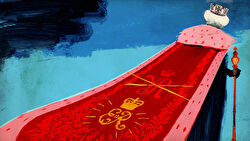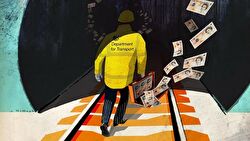
I am just home from Salford, the rain-sodden northern fastness to which the University Challenge studios have been exiled. Of course, no one should ever be surprised by the fact that it rains in the environs of Manchester — the city’s vast number of cotton mills wouldn’t have been built without its damp climate and the consequent abundance of water. Our show’s rented studios are on the site of the old Salford docks, where the cranes and wharfs for manufactured goods have been displaced by offices and fast-found outlets. (Napoleon’s observation about “a nation of shopkeepers” is now hopelessly out of date: we are a nation of checkout operators.)
The studios were especially busy this week because they were also being used to record The Voice, a reality singing contest, versions of which are on air everywhere from Mexico to Vietnam. University Challenge is also a format, of course, but it escapes the obloquy heaped upon the BBC for showing The Voice, because it is about knowledge, rather than karaoke.
The outcry forced the BBC to let The Voice go to the main commercial network, ITV, which has introduced more of the petty cruelties that make reality shows so popular.
Since The Voice yields many more bucks than University Challenge, we were decanted into the outer recesses of the studio block, while various dressing rooms were used for singing practice, and others labelled with notices such as “Wrangling Room” (seriously). Our show belongs in a gentler era of television, and I love it because it gives the lie to the tabloid stereotype that no one knows or cares about anything much. It is also just about the last really hard quiz contest.
Nonetheless, periodically, someone comes along with an idea that they think will have University Challenge make more money. Thus far, we have escaped with just a quiz book. But there is occasional idiotic talk of using a popular brand to sell stationery, children’s games or electronic junk.
Perhaps we might market a revolting jumper, or a bad haircut. Either would be an improvement on one of the ideas — for a Naked University Challenge.
The fly-fishing season is now more or less over. It has, frankly, been a pretty terrible year, and all along the banks of many of the great salmon rivers you can hear people wailing with anxiety about next season. Anyone who has been lucky enough to own a bit of river deserves no sympathy: for decades they have been blithely leasing to mugs the right to try to catch a salmon that may or may not be in the river.
But something is up with this wonderful fish, which is spawned in fresh water, travels to sea to fatten up, and then returns to its natal river to spawn. This year, great numbers of salmon simply did not turn up. In some rivers, there were no summer fish. Others, accustomed to a big flush of salmon in the autumn, found they too had vanished.
This is the time of year when the letters arrive from riverlords, asking whether you’d like to book some fishing for next year. Doubtless, there will be plenty of anglers wondering how they will endure until the season begins again, who will sign on the dotted line. But for me, this is definitely the last time. I seem to recall I’ve said that several times before.
Trout, they say, never let you down.
They do not migrate, so should always be in the river, and if they’re rising to a fly hatching on the surface of the water, they should be catchable, if only you can drop a plausible imitation in front of their nose.
But here, too, is a tale of woe. The glory of southern England is its chalk-streams, babbling clear and cool from underground aquifers and home to a wonderful abundance of wildlife. The great majority of the world’s chalk streams are in England. Unfortunately, southern England is also the most heavily built-upon part of the country and enormous quantities of water are being pumped out of the rivers and their aquifers for the citizenry’s baths, cooking, washing and lavatories.
The huge quantities of fertilisers poured on to the fields and into watercress beds to feed the people don’t help, either, causing massive growths of algae, which suffocate the rivers.
Everyone has noticed how the increasingly effective insecticides used in farming mean that the car journeys of 50 years ago, when you had to wipe squashed flies off the windshield, are long gone. Unfortunately, so too is a food source for trout.
Protection of the environment requires government regulation. A news release last week lays out its plans. The Department for Environment, Food and Rural Affairs — long known as a place of political purgatory, where ambitious politicians suffer torments in hope of preferment somewhere else — has lately been asked to try to reduce the amount of poison and fertiliser spreading from farms into watercourses. You will not be surprised to hear the department’s proposals are feeble stuff. Not as feeble, however, as the drivel with which Thérèse Coffey MP, parliamentary under secretary of state (a sort of political kitchen scullion) at Defra, trumpeted them.
Coffey, or — as she likes to be known, “Dr Coffey” — claimed that their new guidelines were “a win-win for farmers and the environment”. She followed this platitude with the astonishing claim that the guidelines would “set a level playing field for farmers”, which must have delighted hill-farmers in particular.
Of course it cannot be easy balancing the demands of the environment, the population and business: a department hoping to satisfy the environment and food and rural affairs is doomed. But how are we to take seriously a regulator who will not even do us the courtesy of something more than empty cliché?



